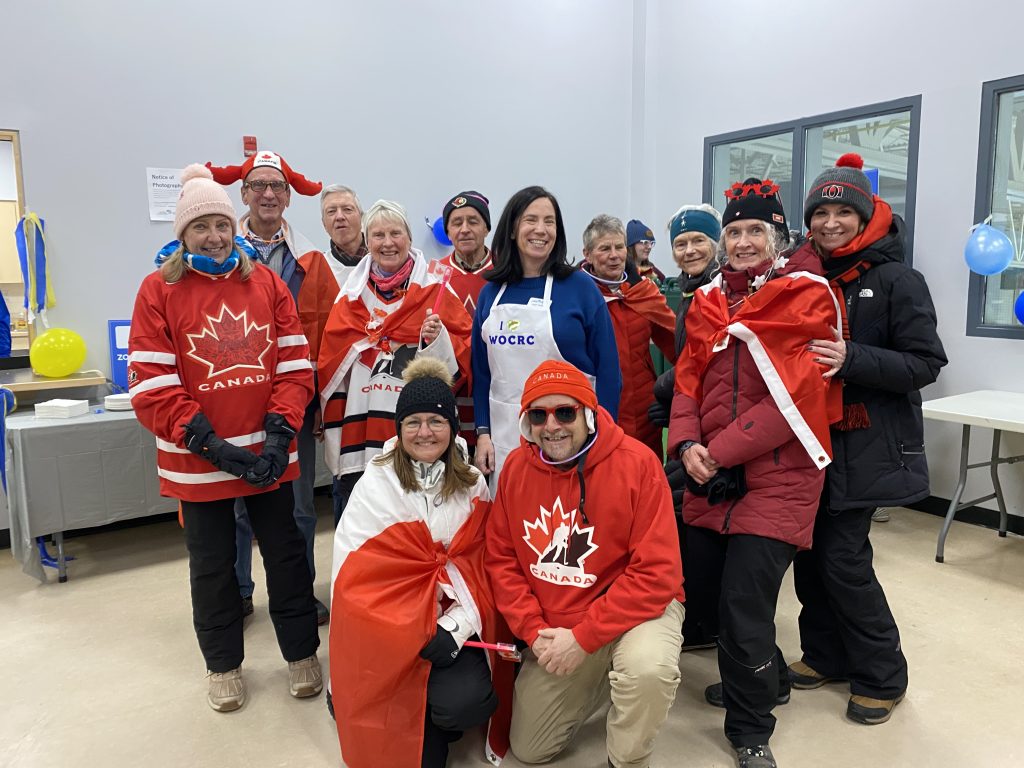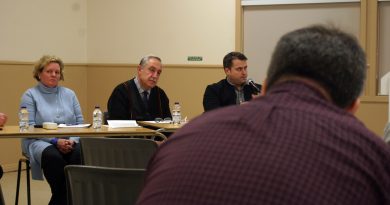Cold night a WOCRC fundraiser
By Nonie Smart - West Carleton Online
KANATA – Last month, the Western Ottawa Community Resource Centre (WOCRC) held its first fundraiser since 2018 and, once again, showed what a concerned community can do.
“It was pretty incredible,” WOCRC executive director Leigh Couture said of their Coldest Night of the Year (CNOY) event (Feb. 22). “We more than doubled our goal and raised just over $45,000.”
Since 2011, the annual CNOY fundraising walk has raised more than $75,000,000 in 190 communities across Canada with 100 per cent of net proceeds staying with local CNOY charity partners. Couture was thrilled to tell West Carleton Online when we chatted at the WOCRC building (2 McNeil Crt.) last week (Feb 28), this year they were also the top fundraiser in their category for all of Canada.
Couture said the event powered by staff, board members and WOCRC volunteers was a resounding success. The turnout far exceeded expectations, and the evening was blessed with perfect weather.

“I got to meet a lot of new community members and hear stories of how people are connected to our work,” she said. “There were lots of local business sponsors and local politicians who supported our fundraising and also came out to the event. For example, our welcome team was from the Royal Bank, they checked people in.”
Twenty-six teams, including one from West Carleton, represented 171 participants of all ages who showed up to walk a route of two or five kilometres through nearby side streets. They set out from the Tony Graham Recreation Complex in Kanata around 5 p.m., with a mid-way break at the WOCRC building before returning to an upstairs hall at the complex for food, refreshments and prize draws, all donated by generous local sponsors.
Before the walk began, West Carleton Online caught up with the West Carleton squad, the Young Hearts, around 4:30 p.m. as team members were getting ready to hit the road. They were easy to pick out of the crowd dressed in red and white with Canadian flags draped over their parkas – a fashion choice that won them the event’s Best Dressed Team award.
The Young Hearts team captain and Dunrobin resident Tillie Bastien told us she got started as a volunteer because she very much appreciated what volunteers had done for her family.
“Mom and dad lived with us for quite some time,” she said. “People came in to help with them, so once they were gone, I wanted to give back. I have been volunteering for WOCRC at Diner’s Club for 27 years and my husband Gary drives for medical appointments.”
Bastien said recruiting the 10-member team for the CNOY walking fundraiser was no trouble at all.
“I just put it out to a few friends and family and they all said, sure,” she said.
Couture says the funds raised from this event will be applied to WOCRC services that specifically support the hurt, hungry and homeless in accordance with the CNOY vision.
“The fundraising we do is to complement and respond to needs we are not funded to support,” she said. “For example, sometimes women leaving at our Chrysalis House (a secure 25-bed shelter) don’t have a lot of things when they are transitioning to a new home. They don’t have any supplies, so we provide financial support to set up new homes for women and their dependents. We also work with people who are food insecure. Sometimes the food bank may not be available, but they need emergency supplies, so we might provide a short-term, one-time food voucher to bridge whatever the plan will be. Another way we can use CNOY funds is to provide breast feeding support. This is an unfunded need, but we do have moms coming to us and asking for that service.”
Couture was appointed executive director in 2021, bringing with her substantial career experience in social services in our city. She says the WOCRC has a surprising depth and breadth in the services they offer.
“What’s unique about us is we are a lifespan organization,” she said. “We have programs for little guys from birth to six. And then we have a lot of programs for seniors. We support some families with multigenerational programming. They might come for the EarlyON program, for example, and then realize they have a parent that would benefit from our dementia adult day program.”
However, Couture predicts it will be an ongoing challenge to maintain the broad scope of WOCRC programs throughout the city’s rapidly expanding far west Ottawa communities.
“We started out as a very small community-based centre, now we support six wards and the people who live in them,” she said. “People have had to move further out of the city to be able to afford housing, that has been such a challenge with the rising cost of housing, the rising cost of food, the cost of everything. We are seeing more and more people coming in and asking for help. So, one of our biggest challenges is operating at capacity but then having asks beyond our capability to respond.”
Rural locations have their own issues says Couture when it comes to funding and service delivery.
“Funding is often related to the big picture population health roll up or economic review so if you have people who are disadvantaged, are low income and who are struggling, it’s not that they aren’t there but their income is masked by people who are higher income. Its really hard for us to find them, it is a challenge for us. It is why we are here – to find folks who are most disadvantaged and to provide support to them.”
Meals on wheels is an example of a program that can be a service delivery challenge says Couture because it costs more to drive a meal to a rural destination.
“A lot of our senior services are health funded and about prevention so people can be healthy at home,” she said. “But for clients who can’t drive, Meals on Wheels is not just a meal, it is also someone who checks in on you – it’s an emergency plan. Not everyone has a family member or partner who is looking out for them.”
Meals on Wheels is another program which will benefit from CNOY fundraising says Couture.
“Sometimes we have folks who can’t pay the fees for programs,” she said. “So, for Meals on Wheels we do offer a subsidy, based on income. What we are seeing is our subsidy capacity shrink as costs increase. Many of our clients are on fixed income so as food prices go up and costs of meals go up you don’t want someone to take less meals. Eating less is not a good solution.”
For further information on WOCRC: www.wocrc.ca.












